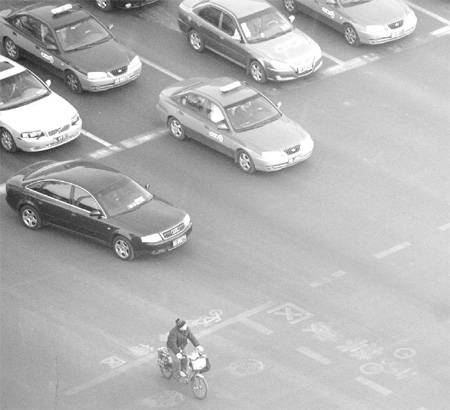Short-term impact seen for auto makers on tax incentive removal
Updated: 2010-12-30 06:49
By Emma An(HK Edition)
|
|||||||
|
A cyclist moves past traffic in Beijing. Analysts predicted car sales growth in China will ease to 15 percent due to the scrapping of the tax incentive. Nelson Ching / Bloomberg |
Finance Ministry to raise tax on smaller vehicles to 10% Jan 1
Analysts cautioned Wednesday that the scrapping of tax incentives for buyers of small cars on the mainland may curb car sales in the short term but market growth and other support measures such as subsidies to fuel-efficient cars will help offset the impact to some extent.
The Finance Ministry said Tuesday that it will raise the tax on vehicles with engines of 1.6 liters or smaller to a uniform 10 percent from 7.5 percent starting January 1. The 10 percent tax rate currently applies to the purchase of vehicles with bigger engines.
In the short run, the end of the tax incentive may put downward pressure on domestic car sales, and small-car manufacturers will probably bear the brunt, analysts suggested.
"The policy will definitely have an adverse impact on China's car sales," Dickie Wong, research director at Kingston Securities, told China Daily. "Small-car makers like Geely and Great Wall Motor will feel the most pain compared with high-end car makers such as Brilliance China."
He expected car sales growth to slow down in the coming months. "Last year, car makers could sell as many as 1.2 million-1.3 million cars a month. Such growth will decelerate in the year ahead," said Wong.
Citigroup analysts predicted that car sales growth in China will ease 10 percentage points in 2011 to 15 percent due to the scrapping of the tax incentive and an anticipated slow down in overall economic growth. "As many consumers have advanced their purchase of cars on expectations of the end of the tax incentive, sales of passenger cars with engines of 1.6 liters or smaller may not be as good as expected for the first half of 2011," the analysts said in a research note to investors. However, a 3,000 yuan subsidy for fuel-efficient cars may help make up for some of the losses, they added.
However, analysts at Bank of Communications (BOCOM) International were more optimistic on the prospect for car sales despite the end of the tax incentive. "The impact the end of tax incentive will have on car sales is negligible. Rather, the impact is more psychological," they said in a research note released Wednesday. "It is income growth and car price decrease that are having a final say in people's decision to purchase cars," the analysts added.
The BOCOM analysts left unchanged their earlier forecast that 19.5 million-20 million cars will be sold in 2011, which will help achieve industry-wide growth of around 10 percent.
As some analysts were concerned about slower growth, industry players largely played down the likely impact the higher tax rate will exert on their sales in 2011.
BYD and Geely both believed that the introduction of new models and other government measures will provide a cushion against the new policy to end tax incentives.
And General Motors also remained bullish on car demand in China. "Some of the government incentives will be taken off, but there is tremendous underlying demand for product in China," Kevin Wale, General Motors Co China president, said last week in Guangzhou.
Shares of Dongfeng Motor Group Co Ltd rebounded 3.73 percent to close at HK$13.34 in Hong Kong trading Wednesday as the market has discounted the news. Brilliance China Automotive Holdings Ltd gained 4.58 percent to close at HK$5.71 and Geely edged up 3.61 percent to close at HK$3.44.
Bloomberg contributed to this story.
China Daily
(HK Edition 12/30/2010 page3)
